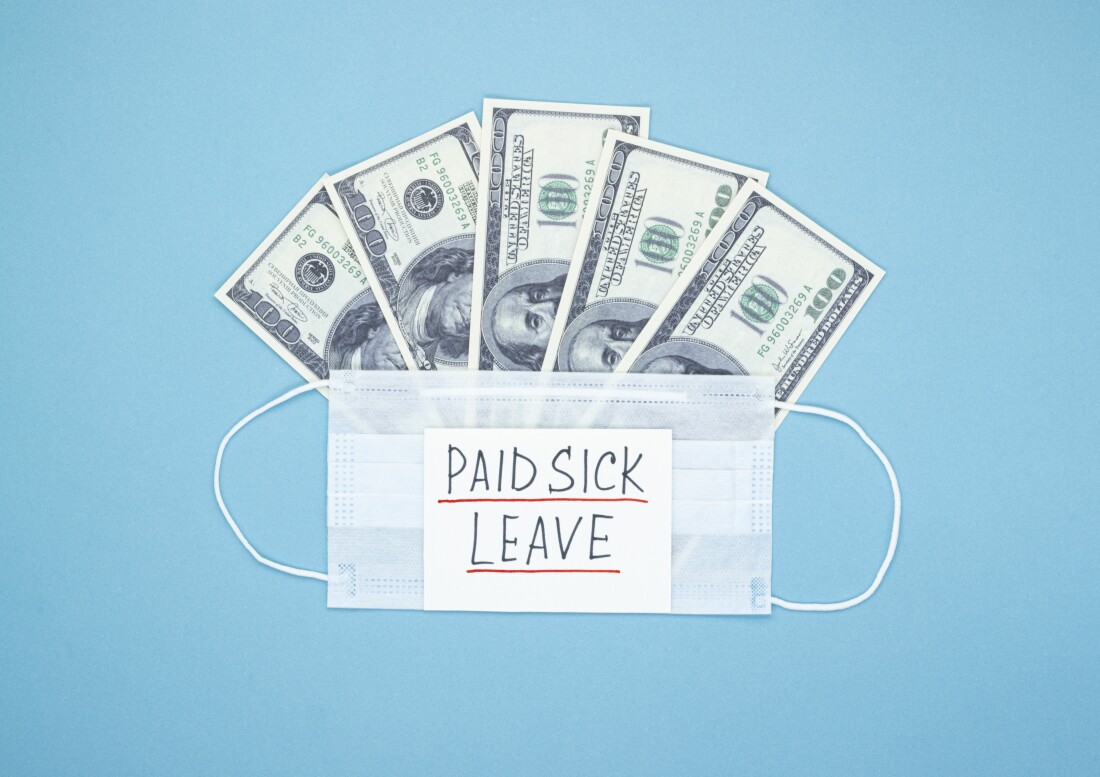COVID-19 Related Paid Leave Tax Credits Extended Into 2021
 The federal government enacted the Families First Coronavirus Response Act (“FFCRA”) on March 18, 2020. The FFCRA was intended to provide support to workers who were unable to work while complying with government-mandated quarantines following exposure to COVID-19 or while taking care of someone else in quarantine. The law required employers with fewer than 500 employees (“covered employers”) to pay certain employees Emergency Paid Sick Leave, Emergency Family Medical Leave and/or Expanded Emergency Family and Medical Leave (together, “FFCRA Leave”) as more fully described below.
The federal government enacted the Families First Coronavirus Response Act (“FFCRA”) on March 18, 2020. The FFCRA was intended to provide support to workers who were unable to work while complying with government-mandated quarantines following exposure to COVID-19 or while taking care of someone else in quarantine. The law required employers with fewer than 500 employees (“covered employers”) to pay certain employees Emergency Paid Sick Leave, Emergency Family Medical Leave and/or Expanded Emergency Family and Medical Leave (together, “FFCRA Leave”) as more fully described below.
Notably, the FFCRA did not leave employers hanging out to dry. It provided a dollar-for-dollar reimbursement in the form of a federal payroll tax credit to covered employers obligated to pay employees FFCRA Leave through December 31, 2020.
The FFCRA expired on December 31, 2020, but portions were extended in the Consolidated Appropriations Act (“CAA”) signed into law by President Trump on December 27, 2020. Unlike the FFCRA, the CAA does not require covered employers to pay FFCRA Leave. Instead, it gives these covered employers the option to do so between January 1, 2021 and March 31, 2021. If they choose to pay FFCRA Leave to qualifying employees, covered employers will receive the same federal payroll tax credit as laid out in the FFCRA. Descriptions of the various types of FFCRA Leave are below.
- Emergency Paid Sick Leave (“EPSL”). To qualify for EPSL, an employee must be unable to work because they are experiencing COVID-19 symptoms and/or quarantining pursuant to a federal, state, or local order. Covered employers choosing to pay EPSL shall pay qualifying employees their regular rate of pay for up to two weeks while the employee remains off work. Of course, this only applies to those employees who are unable to telework.
- Emergency Family and Medical Leave (“EFML”). To qualify for EMFL, an employee must be unable to work because of a need to care for either another who is quarantining pursuant to a governmental order or a child whose school or child care provider is closed due to COVID-19. Employees choosing to pay EFML shall pay qualifying employees two-thirds of their regular rate of pay for up to two weeks.
- Expanded Emergency and Family Medical Leave (“EEFML”). Finally, to qualify for EEFML, an employee must have been employed for at least 30 days and unable to work due to their need to care for a child whose school or child care provider is closed due to COVID-19. Covered employers choosing to pay EEFML shall pay qualifying employees two-thirds of their regular rate of pay for an additional 10 weeks.
So, covered employers are left in a situation where, until March 31, 2021, they may choose to pay their employees FFCRA Leave (and they are entitled to a dollar-for-dollar tax credit if they do), but they are not required to do so.
FFCRA Leave, Tax Credits and Workers’ Compensation
The FFCRA and the CAA were, in part, intended to take care of employees of certain employers in circumstances where the employees may not otherwise be entitled to workers’ compensation. Below, we have outlined some situations that are occurring often.
- From April 1, 2020 through December 31, 2020. Assuming a worker properly quarantined after being exposed to someone with COVID-19, whether at work or otherwise, and was not diagnosed with COVID-19 during the quarantine period[1], he is not entitled to any workers’ compensation benefits. He is, however, entitled to FFCRA paid leave.
- If, instead, the worker was diagnosed with COVID-19 during the quarantine period, he may be entitled to workers’ compensation. His entitlement would largely depend on whether he qualifies for the rebuttable presumption as we discuss here and also the specific facts of the situation.
- From January 1, 2021 through March 31, 2021. Assuming a worker properly quarantines after being exposed to someone with COVID-19, whether at work or otherwise, and is not diagnosed with COVID-19 during the quarantine period, then he is neither entitled to workers’ compensation nor FFCRA paid leave. However, his employer may choose to pay FFCRA leave and, if the employer employs fewer than 500 workers, then they are entitled to a dollar-for-dollar reimbursement in the form of a federal payroll tax credit.
- Again, if the worker is diagnosed with COVID-19 during the quarantine period, he may be entitled to workers’ compensation depending upon the availability of the rebuttable presumption and the facts of the situation.
With all of the changes in the law, employers, carriers, and third-party administrators should consult a workers’ compensation attorney regarding each COVID-19 claim. Each situation is very fact-dependent. Please let us know if you have any questions.
[1] According to updated guidance from the Michigan Department of Health and Human Services (“MDHHS”) as of December 2, 2020, the standard 14-day quarantine period remains for individuals who know they were exposed to a COVID-19 positive individual. MDHHS did, however, allow that quarantine period to be reduced to 10 days if the exposed individual does not develop any symptoms of COVID-19 after 10 days and they continue to monitor their symptoms for at least four more days.
Categories: COVID-19 and Workers' Compensation, Employee Benefits, Employment, Workers' Compensation

Alicia Birach is a member of the Employer Services Practice Group and works out of the firm's Southfield office. She has extensive experience representing insurance carriers, third party administrators and employers against workers' compensation claims. Additionally, she is experienced in counseling employers on labor and employment issues.
View All Posts by Author ›
Mike is a member of the Firm’s Employer Services practice group. His practice focuses on representing employers, insurance carriers, and third-party administrators in workers’ compensation matters across Michigan. He has experience advising clients on various labor and employment law issues as well.
View All Posts by Author ›
Currently, Brian Goodenough chairs the firm's Employer Services Practice Group where he practices municipal law, zoning and land-use disputes and workers' compensation law. Previously, he served as a member of the firm's Executive Committee and as an officer of the firm.
View All Posts by Author ›
Mike devotes his practice to the representation of employers, insurance carriers, and third-party administrators in workers' compensation matters throughout the state. He is the author of several published law review articles on workers' compensation topics, and he is a frequent lecturer on this topic.
View All Posts by Author ›



 Share
Share
